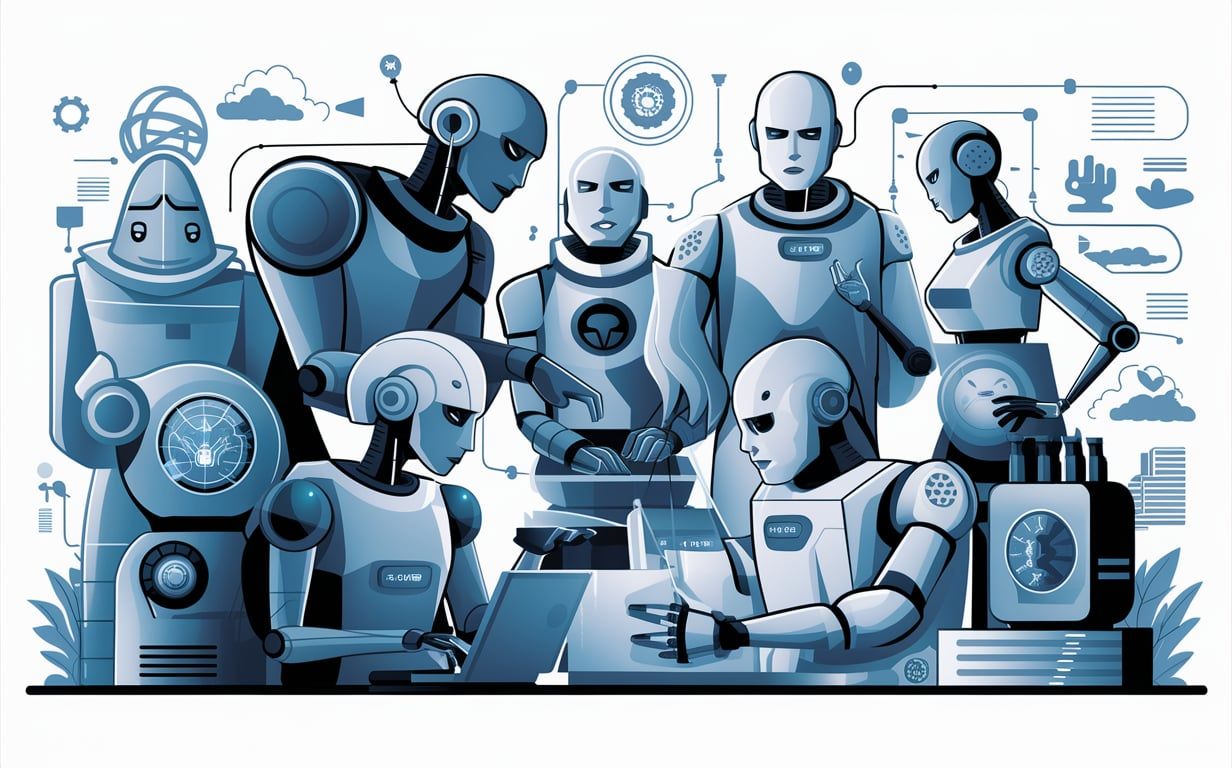
Your New Workforce: Autonomous AI Agents at Your Service
Autonomous AI agents are revolutionizing the concept of a digital workforce, enabling companies and individuals to delegate complex and repetitive tasks to these “virtual workers.”
Artificial intelligence continues to advance, and one of the most recent innovations is the use of autonomous AI agents. This type of technology allows users to rely on “virtual assistants” that can execute tasks independently. Imagine having a team of AIs that can perform repetitive work, manage information, or even coordinate with each other to achieve complex results. This opens up the possibility for anyone, without being a programming expert, to have their own “digital workforce.”
With NoCode and LowCode applications, we can build web apps with autonomous AI agents that, using artificial intelligence, perform complex tasks that save a company enormous amounts of time, and give it new capabilities to reuse the workforce where it is most useful, rather than performing repetitive tasks.
“AI agents are like magic… these magical entities that go beyond typical chatbots.”
Patrick Hamelin, Botpress
What Are Autonomous AI Agents?
Autonomous AI agents are programs designed to make decisions and complete tasks without constant human supervision. They are based on advanced machine learning models that analyze data and make decisions based on patterns, rules, and specific objectives. These agents not only respond to basic commands but can also handle entire workflows, improve their processes through continuous learning, and coordinate with other agents to achieve shared goals. According to Patrick Hamelin, chief software engineer at Botpress, “AI agents are like magic… these magical entities that go beyond typical chatbots.”
Advantages of Having an Autonomous AI Workforce
- Automation of Repetitive Tasks: These agents can take over time-consuming tasks like responding to emails, analyzing large volumes of data, or generating periodic reports. This allows users to focus on more strategic activities.
- Increased Productivity: A team of autonomous agents can work 24/7, performing multiple tasks simultaneously. This means processes that used to take days or weeks could now be completed in hours or even minutes.
- Ease of Use: Platforms developed by companies like Anthropic and OpenAI have made using these agents accessible to those without technical experience. Through user-friendly interfaces, users can set up AI agents for various business functions, improving processes without needing to develop code.
- Adaptability and Continuous Improvement: Autonomous AI agents learn and adapt over time. By analyzing their own results, they can adjust their behavior to improve accuracy and efficiency in each task.
- Scalability: As work needs grow, it’s possible to configure more agents that collaborate with each other, facilitating the management of large workloads without needing to hire additional staff.
Use Cases of Autonomous Agents in Businesses
These agents can be applied in areas like customer service, marketing, logistics, and project management. For example, in digital marketing, a team of agents could analyze social media data, generate performance reports, and even propose content strategies. In customer service, agents can answer frequently asked questions or direct issues to the appropriate departments, improving the customer experience and reducing response times.
The future of work is changing, and autonomous AI agents are a clear example of this transformation. They not only enable companies and individuals to optimize their daily activities but are also democratizing access to advanced tools that were once exclusive to large corporations. Now, anyone with access to these platforms can have their own “virtual workforce” for automated tasks, thus improving efficiency and boosting growth.
With technology advancing rapidly, these autonomous agents not only represent a technical breakthrough, but also an opportunity for companies of all sizes to explore new levels of productivity and efficiency. As mentioned in a World Economic Forum panel, “virtual assistants could transform the way we make decisions and even interact.” The key will be finding the balance between autonomy and human intervention to maximize the potential they offer.
Find here an example of an autonomous agent applied to inspections.
